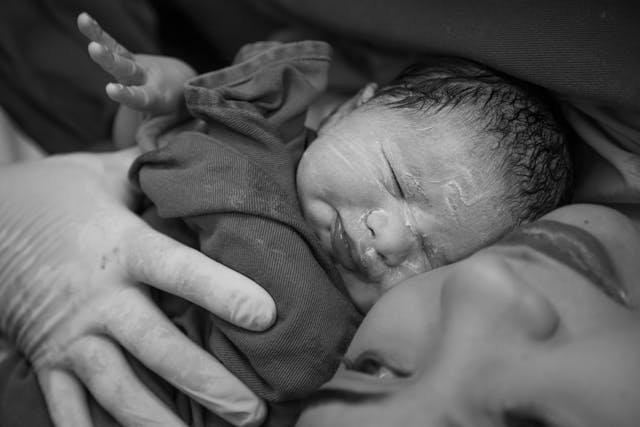Becoming a new mother is an incredible journey filled with joy, love, and countless memorable moments.
However, it can also bring significant challenges, particularly when it comes to mental health.
Transitioning from pregnancy to motherhood requires not only physical but also emotional and psychological adjustments.
In this comprehensive guide, we will explore essential strategies and tips to help new mothers nurture their mental well-being.

Understanding Postpartum Emotions
The Baby Blues vs. Postpartum Depression
Firstly, it’s crucial to understand that experiencing a range of emotions after childbirth is entirely normal.
Many new mothers go through the “baby blues,” characterized by mood swings, crying spells, anxiety, and difficulty sleeping.
These symptoms typically peak a few days after birth and subside within two weeks.
However, if these feelings persist or intensify, they might be indicative of postpartum depression (PPD), a more serious condition that affects roughly 1 in 7 new mothers.
Symptoms of PPD include severe mood swings, excessive crying, difficulty bonding with the baby, withdrawal from family and friends, and even thoughts of harming oneself or the baby.
Recognizing these signs early and seeking professional help is essential for the well-being of both the mother and the child.
Self-Care Strategies for New Moms
Prioritizing Sleep, Nutrition, and Exercise
Taking care of yourself is not a luxury; it is a necessity.
Adequate sleep, proper nutrition, and regular exercise can significantly impact your mental health.
- Sleep: Lack of sleep can exacerbate feelings of stress and anxiety.
Whenever possible, try to nap when your baby naps.
It might also be helpful to share nighttime duties with your partner or a family member to ensure you get some rest. - Nutrition: Eating a balanced diet rich in fruits, vegetables, whole grains, and lean proteins can help stabilize your mood and energy levels.
Avoid excessive caffeine and sugar, which can lead to energy crashes. - Exercise: Physical activity releases endorphins, which are natural mood lifters.
Even a short walk with your baby can help improve your mood and overall mental health.
Finding Time for Yourself
New mothers often feel guilty about taking time for themselves, but self-care is crucial.
Engage in activities you enjoy, whether it’s reading a book, taking a bath, or practicing a hobby.
Remember, a well-rested and happy mother is better equipped to care for her baby.
Building a Support System

Asking for Help
One of the most important aspects of maintaining mental health as a new mother is having a strong support system.
Don’t hesitate to ask for and accept help from family and friends.
Whether it’s help with household chores, cooking meals, or watching the baby for a few hours, every bit of assistance can make a big difference.
Connecting with Other New Mothers
Joining a support group or connecting with other new mothers can provide immense comfort and reassurance.
Sharing experiences, challenges, and advice with those who are going through the same stage of life can help alleviate feelings of isolation and anxiety.
Utilizing Online Resources and Communities
In today’s digital age, numerous online communities and resources are available to support new moms.
Forums, social media groups, and online therapy can offer support and advice around the clock, providing an additional layer of support.
Communication with Your Partner
Maintaining Open Dialogue
Effective communication with your partner is vital during this time. Share your feelings, concerns, and needs openly.
This can help in managing expectations and reducing misunderstandings.
Remember, you’re a team, and supporting each other is key to navigating the challenges of new parenthood.
Sharing Responsibilities
Dividing parenting duties can help alleviate some of the pressures and stress associated with motherhood.
Discuss and distribute tasks such as feeding, diaper changes, and household chores to ensure a balanced workload.
This not only benefits your mental health but also strengthens your partnership.

Mindfulness and Stress-Reduction Techniques
Benefits of Mindfulness
Mindfulness practices can be incredibly beneficial for new mothers.
These techniques help you stay present and manage stress more effectively.
Mindfulness can be practiced through meditation, deep breathing exercises, or simply taking a few moments each day to focus on the present moment.
Easy-to-Follow Exercises
- Breathing Exercises: Deep, slow breathing can help calm your mind and reduce stress.
Try inhaling for four counts, holding your breath for four counts, and exhaling for four counts. - Progressive Muscle Relaxation: This involves tensing and then slowly relaxing each muscle group in your body, starting from your toes and working your way up to your head.
- Short Meditation: Even five minutes of meditation can help center your mind and reduce anxiety.
Use guided meditation apps or simply sit quietly, focusing on your breath.
Seeking Professional Help
Importance of Mental Health Check-Ups
Just as you have regular check-ups for your physical health, it’s important to monitor your mental health.
Discuss any concerns with your healthcare provider during postpartum visits.
They can offer guidance and refer you to a mental health professional if needed.
Finding the Right Therapist or Counselor
If you feel overwhelmed, it might be beneficial to seek help from a therapist or counselor specializing in postpartum mental health.
They can provide coping strategies, support, and therapy tailored to your needs.
Don’t hesitate to explore telehealth options if in-person visits are challenging.
Creating a Positive Environment
Organizing Your Home
A well-organized, clutter-free home can significantly reduce stress.
Set up a cozy, baby-friendly space that feels comfortable and calming.
Small touches like soft lighting, soothing colors, and comfortable furniture can create a serene environment.
Incorporating Soothing Elements
Elements such as calming music, aromatherapy with essential oils like lavender or chamomile, and maintaining a clean, orderly space can enhance your mental well-being.
These small changes can make a big difference in creating a peaceful atmosphere for you and your baby.
Balancing Expectations and Realities

Letting Go of Perfectionism
Motherhood is not about perfection. Let go of unrealistic expectations and be kind to yourself.
Every mother makes mistakes; it’s part of the learning process.
Focus on doing your best rather than being perfect.
Setting
Realistic Goals
Set achievable goals each day, even if they are small.
Accomplishing these goals can give you a sense of fulfillment and progress.
Celebrate your victories, no matter how minor they may seem.
Embracing Your Unique Journey
Every new mother’s experience is different.
Comparing yourself to others can lead to unnecessary stress and feelings of inadequacy.
Embrace your unique journey and understand that everyone faces their challenges.
Conclusion
Encouragement to Prioritize Mental Health
In conclusion, the transition from pregnancy to motherhood is a monumental change that comes with both joys and challenges.
Prioritizing your mental health is not just beneficial for you but also for your baby and family.
Implementing self-care strategies, building a support system, maintaining open communication with your partner, practicing mindfulness, and seeking professional help when necessary are all essential steps to ensure your well-being during this period.
Reassurance that Seeking Help is a Sign of Strength
Remember, seeking help is a sign of strength, not weakness.
If you find yourself struggling, don’t hesitate to reach out to healthcare providers, therapists, or support groups.
Taking care of your mental health is a crucial part of being the best mother you can be.
Final Thoughts
Motherhood is an incredible journey filled with love, learning, and growth.
By taking proactive steps to nurture your mental health, you are setting the foundation for a happy, healthy, and fulfilling motherhood experience.
Always remember, that a well-cared-for mother is the cornerstone of a thriving family.



